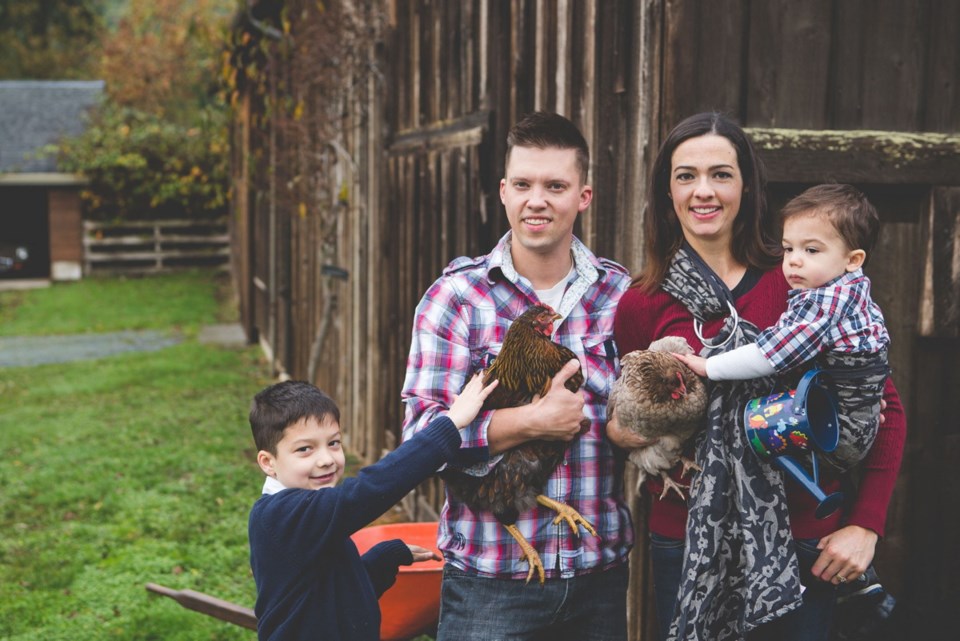Chicken and bee rentals are coming to Greater Victoria.
A Victoria woman is busy building chicken coops that will be available to rent from May to October to backyard urban farmers. Kate Fraser is also building bee hives for year-round rentals.
The rent-a-chicken-and-bee business will be rolled out in spring 2016.
Chicks are hatching now, said Fraser, owner of Bees Please Farms.
She has ordered a variety of chicken breeds to give customers a choice. Some even lay blue-coloured eggs.
Fraser recently launched her website offering short-term rentals at beespleasefarms.com. Orders are coming in, but she declined to reveal numbers to date.
Fraser is affiliated with Pennsylvania-based Rent the Chicken. It was established in 2013 and now has seven locations in Canada and 17 in the U.S. She is doing bees on her own.
Hen renters will receive a moveable coop and everything else necessary, including food and support.
They can choose either two chickens, producing eight to 14 eggs per week in total, for $425 plus tax per season, or four chickens that will deliver 16 to 28 eggs per week, for $600. A $1,000 package includes four hives.
The annual cost for two hives is $300, while four hives are $500. Fraser takes care of the bees’ health and honey collection. Renters get jars of honey from the hives and know that they are helping pollinate local plants.
Urban chickens and honey bee hives have become increasingly popular. Renting solves the problem for people who aren’t ready or able to make a commitment, Fraser said.
The mother of two boys has five chickens at home. Backyard chickens allow parents to teach children where their food comes from, Fraser said.
“It is really neat to be able to go into the backyard and get your own eggs.”
Renters can choose to adopt the chickens. If chickens are returned in the winter, they will be cared for on land in View Royal.
Nicholas Scapillati, executive director of FarmFolk CityFolk, a non-profit society dedicated to support local, sustainable food and local growers, said from Vancouver that renting chickens is a “wonderful idea.”
He lets his own chickens run in the backyard in the winter, where they keep slug numbers down and fertilize and till the soil.
Victoria Mayor Lisa Helps has six hens — Bonny, Yolko, Eggie, Chicken Licken, Feather and Rosie.
“They are very entertaining,” said Helps. “We do a lot of gardening. They produce very good fertilizer. They eat all of our kitchen scraps. The green bin sees very little. They are a nice backyard companion and they produce breakfast.”
At Buckerfield’s Central Saanich store, the birds and the bees product categories are humming.
Interest in backyard chickens started increasing a few years ago and bee sales are taking off these days, said Travis Young, store manager.
It can cost $200 to $300 per hive and Buckerfield’s will recommend sources selling bees, which cost about $150.
Young attributes the interest to rising awareness of the importance of keeping the bee population healthy. Municipalities are fine-tuning bylaws to allow urban hives.
Hives animate backyards, he said, noting that honeybees are not aggressive. “It’s a fun, easy hobby. It’s really good for our local environment.”
As for chickens, the store sells about 2,000 chicks every spring. Many go to local hobby farmers, while hundreds are bought for urban yards, Young said. Chicks start at $3.99, with prices depending on the variety of chicken.
Some people build their own coops, while others will spend between $300 and $600 for a coop kit, Young said. Buckerfield’s sells everything from chicken feeders and heat lamps to feed.
The B.C. Society for the Protection of Cruelty to Animals warns, however, that caring for chickens takes time, effort and expertise. The organization recommends consumers buy eggs from SPCA-certified farmers and other certified cage-free farmers.
Geoff Urton, senior manager of stakeholder relations, said the SPCA has not seen major problems with the rising interest in backyard chickens, adding it’s likely that people are keeping their hens as pets after egg production drops off.
Urton points to the city of Vancouver’s “rigorous” rules governing backyard chickens. Anyone with chickens has to register with the city, which is also required in municipalities such as Saanich and Oak Bay. Owners are also not allowed to kill their own chickens.



